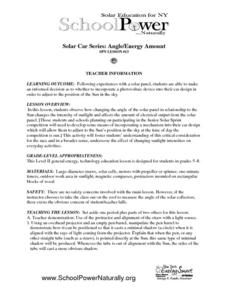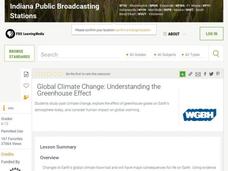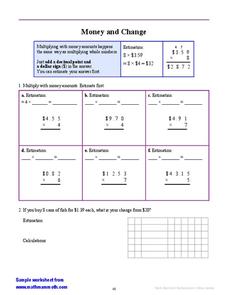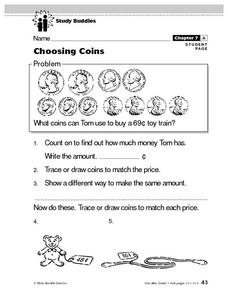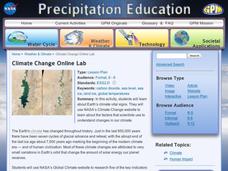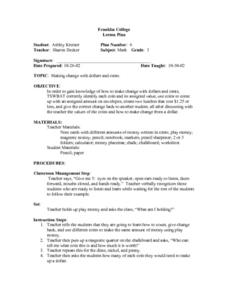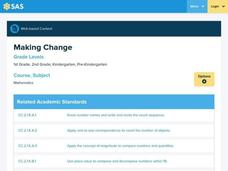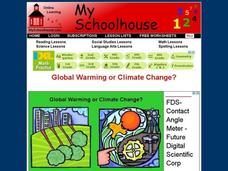Curated OER
Solar Car Series: Angle/Energy Amount
Does the angle of a solar panel change the output? Emerging engineers find out! Demonstrate for your class how they can angle a straw to match the angle of light rays coming from a source. Then turn them loose to experiment with the...
Curated OER
Estimating Heat Changes during Reactions Using Bond Energies
For advanced chemists, this worksheet examines heat change during chemcial reactions. Alkanes are examined first. Learners calculate the energy released or needed during a reaction.
Curated OER
Ozone Hole - Changes in the Stratosphere
Halting the depletion of the hole in the ozone layer has been one of humanity's happy recoveries from previous damage done to the environment. Meteorology masters muse the Montreal Protocol and examine data on changes in the ozone....
Curated OER
Amounts of Dissolved Oxygen in Various Bodies of Water
Learners test water to determine the dissolved oxygen content while displaying the proper use of testing instruments while visiting water testing sites. They determine if the amount of dissolved oxygen is appropriate for the tested...
Polar Trec
Global Snow Cover Changes
Snow is actually translucent, reflecting light off its surface which creates its white appearance. Pairs or individuals access the given website and answer questions about snow cover. They analyze graphs and charts, examine data, and...
US Environmental Protection Agency
Getting to the Core: The Link Between Temperature and Carbon Dioxide
Polar ice samples provide scientists with valuable information about the condition of the atmosphere for hundreds of thousands of years in the past. Of particular interest is the amount of carbon dioxide in the atmosphere and its...
Curated OER
Global Climate Change: Understanding the Greenhouse Effect
Students define the term 'global climate change' and explore how it affects our lives. They research greenhouse gases and identify what events are causing an increase in the amount of greenhouse gases in our atmosphere. Students view...
American Chemical Society
Controlling the Amount of Products in a Chemical Reaction
Everyone enjoys combining baking soda and water. Here is a lesson that challenges scholars to analyze the reaction three different ways — the real substances, the chemical equation, and the molecular models. Class members experiment to...
American Chemical Society
Change in Temperature - Exothermic Reaction
Alone, or as part of the intended unit on chemical reactions, this activity allows learners to experience an exothermic reaction. Here, learners add calcium chloride to a baking soda solution and watch the temperature rise! They will...
Math Mammoth
Money and Change
In this consumer math learning exercise, learners estimate and then multiply the given money amounts. Students also practice finding change. There are seven problems to complete.
Curated OER
Hypothermia: Temperature Changes Under Varying Conditions
Students conduct an experiment to determine what type of clothing would be most suitable for outdoor activities. They determine the temperature changes of the skin under various wet clothing materials and graph the temperature changes. ...
Curated OER
Place Value: Making Change with Canadian Money
In this place value: making change with Canadian money worksheet, students use a spreadsheet and certain coins to practice and record how much change would be given from a $5 bill. A parent or tutor adjusts the questions to the child's...
Curated OER
AMOUNT OF GREENHOUSE GASES IN THE GLOBAL ATMOSPHERE
Students feel the changes of the amounts of greenhouse gases in the global atmosphere. They learn that the amounts of greenhouse gases in the global atmosphere are clearly changing. Some evidences of these changes include levels of...
Curated OER
Choosing Coins
In this mathematics worksheet, 1st graders identify what coins can be used to buy a toy train. Then they count out how much money is given and write that amount in cents. Students also trace or draw the coins to match each price listed.
Chicago Botanic Garden
Historical Climate Cycles
Ice core samples give scientists access to climates of old—those from more than 800,000 years ago. Through an analysis of various temperature graphs from ice cores, tree rings, and weather stations, scholars compare historical climates...
Chicago Botanic Garden
Climate and Forest Ecosystem Services
Forests, through sequestration, capture excess carbon dioxide in our atmosphere and store it, aiding in climate change. The third installment in a four-part series on how climate impacts forests explores carbon sequestration. Classes...
NOAA
Where Have All the Glaciers Gone?
What happens when ice melts? Well ... water happens. When that melting ice is a glacier, the amount of water that results produces change throughout the world. Middle school science sleuths uncover the truth about global warming, the...
NASA
Climate Change Online Lab
What are the key indicators that show scientists that our planet is in the fastest warming trend ever? Learners go on a WebQuest to examine the evidence for themselves. Following several links to NASA sites, kids see how the global...
Chicago Botanic Garden
Unit 4 Pre-Assessment
Pre-assessments are great to help teachers determine what information their classes lack, what misconceptions they have, and how in depth to teach specific concepts. The first in a five-part series is a pre-assessment of middle...
Curated OER
Making Change with Dollars anc Cents
Third graders increase their knowledge of how to make change with dollars and cents by correctly identifying coins along with their values and then using coins to make an assigned amount which will be written on envelopes. They then...
Curated OER
Nothing New? A Physical Change
Fifth graders discuss the differences between chemical and physical changes. In groups, they complete experiments and discover how a physical chnage can be reversed. To end the lesson, they review the steps of the water cycle and...
Curated OER
Physical and Chemical Changes
Students examine the different changes in matter. In this chemical change lesson plan students determine the amount of reactant made in a reaction using the law of conservation.
Pennsylvania Department of Education
Making Change
Young scholars make change from play money they use based on prices mentioned in a book they read. In this making change lesson plan, students use subtraction to find their change amount.
My Schoolhouse
Global Warming or Climate Change?
In this online interactive global warming and climate change learning exercise, students respond to 10 multiple choice questions regarding the information included in the provided paragraphs.


